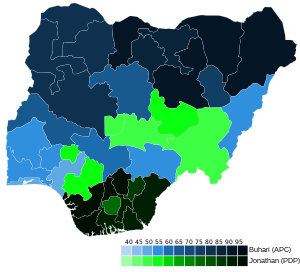| |||||||||||||||||||||||
|
| |||||||||||||||||||||||
Presidential election | |||||||||||||||||||||||
68,833,476 registered voters[1] At least 25% of the vote in 2/3 of states + majority of votes needed to win | |||||||||||||||||||||||
|---|---|---|---|---|---|---|---|---|---|---|---|---|---|---|---|---|---|---|---|---|---|---|---|
| Turnout | 43.65%[2] ( | ||||||||||||||||||||||
| |||||||||||||||||||||||
 States won by Jonathan (in green) and Buhari (blue) | |||||||||||||||||||||||
| |||||||||||||||||||||||
 |
|---|
|
|
General elections were held in Nigeria on 28 and 29 March 2015, the fifth quadrennial election to be held since the end of military rule in 1999.[3] Voters elected the President and members to the House of Representatives and the Senate. The incumbent president, Goodluck Jonathan, sought his second and final term.
The elections were first scheduled to be held on 14 February 2015. However, the electoral commission postponed it by six weeks to 28 March, mainly due to the poor distribution of Permanent Voter Cards, and also to curb ongoing Boko Haram insurgency in certain north-eastern states.[4] The government closed its land and sea borders from midnight on 25 March until the end of the polling date.[5] The election was extended to 29 March due to delays and technical problems with the biometric card readers.[6]
It was the most expensive election ever to be held on the African continent.[7] Nigeria is the continent's most populous country, has the largest economy and is its leading oil producer. Opposition candidate Muhammadu Buhari won the presidential election by more than 2.5 million votes.[8] Incumbent President Goodluck Jonathan conceded defeat on 31 March, before the results from all 36 states had been announced.[9] The election marked the first time an incumbent president had lost re-election in Nigeria. The President-elect was sworn in on 29 May 2015, marking the first time since Nigeria gained independence in 1960 that a sitting government peacefully transferred power to an elected member of the opposition. Buhari flipped many states that had voted PDP in the previous election.
- ^ "Publication of the Register of Voters for the 2015 General Elections" (PDF). Independent National Electoral Commission. 13 January 2015. Archived from the original (PDF) on 4 April 2015. Retrieved 12 February 2015.
- ^ "Voter turnout data for Nigeria". International IDEA. International Institute for Democracy and Electoral Assistance. Archived from the original on 5 May 2015. Retrieved 28 April 2015.
- ^ Nigeria IFES.
- ^ "Nigeria delays elections over Boko Haram threat". Independent. 7 February 2015. Archived from the original on 1 May 2022. Retrieved 7 February 2015.
- ^ "Citing security concerns, Nigeria closes border ahead of election". Aljazeera. 25 March 2015. Retrieved 30 March 2015.
- ^ "Nigeria election extended to Sunday after delays".
- ^ "Nigeria elections: Nation split in Jonathan-Buhari contest". BBC News. 26 March 2015. Retrieved 30 March 2015.
- ^ Schneider, James (31 March 2015). "Buhari Wins, Jonathan concedes". NewAfrican. Archived from the original on 2 April 2015. Retrieved 31 March 2015.
- ^ "Nigeria election: Muhammadu Buhari wins". BBC News. 31 March 2015. Retrieved 31 March 2015.

